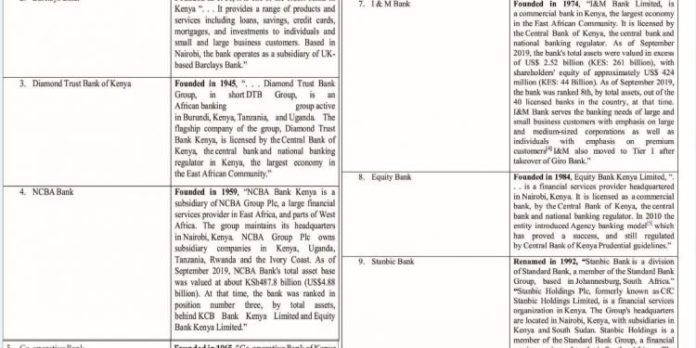By Emeka Aniagolu
In a reportage, titled: “Nigerians plotting to colonize Kenya through banks, marriages – Kenyan professor,” by Bernice Eke, and published online on July 24, 2020; it was stated that: “with Access Bank’s acquisition of Kenya’s Transnational Bank,” one professor XN Iraki of the University of Nairobi, “. . . said Nigerians are not only coming but “have already arrived” to take over his country.” The report went on to state that Professor Iraki “made the remark in an alarming article published in The Standard, one of Kenya’s largest newspapers, lamenting how Nigerian banks like UBA and GTB have gained “a foothold” in the country.
Professor Iraki based his claim of Nigerians grand strategy to “colonize” Kenya using three mechanisms: (1) Churches and Movies; (2) the Banking Industry and (3) Marrying Kenyan women. If it sounds uncomfortably like a warmed over version of South African xenophobia and peevish histrionics targeting Nigerians and other Africans, that’s only because it is. But let me not get ahead of myself.

One of the major ways through which propagandists ply their nefarious trade is to avoid abiding with facts. Or, if they are unable to completely circumvent facts, to distort them. Facts, understandably, are their worst enemies, because the whole purpose of propaganda and propagandists, is to create a perception in the mind of their target(s), such that the individual or individuals, react emotionally to the waving of their red flags, without thinking, and certainly, without abiding with facts and figures. Let me, therefore, share with the ‘not-so-good professor’ and the Kenyan public a few HARD FACTS.
The Central Bank of Kenya oversees the entire banking industry of Kenya. No local or foreign bank can establish, let alone, operate in Kenya, without the express permission and oversight of the Central Bank of Kenya. Therefore, no matter how smart, skilled, educated or business savvy Nigerians, or anyone else, for that matter, may be, they do not have the power nor the authority to participate in the banking industry of Kenya, without the express authorization/licensing of the Central Bank of Kenya. The same applies to all the other independent African countries and the world, writ large.
Second, as at last count, there were a total of 44 main banking institutions in Kenya, 31 of which, are locally owned; while 13 are foreign-owned. Of those thirteen foreign-owned banks, only three are Nigerian-owned; and based on the shortlist below of the biggest banks in Kenya, along with the national origins of their owners; not one of the three Nigerian banks operating in Kenya made the shortlist of those ten!
UBA Kenya, Ltd., is comparatively, actually a small commercial bank in Kenya. It is a subsidiary of the Nigerian financial conglomerate—United Bank for Africa—which has subsidiaries in 20 African countries, the United States, the UK and France. Established in Kenya in 2009, with a capital investment of KES 2.5 billion (approx. U.S. $25 million), the bank accumulated losses of KES 1.4 billion (approx. U.S. $14 million) in the seven years that followed its establishment in Kenya. UBA Kenya, Ltd., made a profit for the first time during the first half of 2016. As of 2016, it employs 70 people in Kenya.
Finally, Access Bank, which just established its Kenyan subsidiary in February 2020, after acquiring 100% shareholding of the Kenyan bank—Transnational Bank Plc.—with the approval of the Central Bank of Kenya; is the third Nigerian bank doing business in Kenya. Prior to its acquisition in Kenya, Access Bank, which is listed on the Nigerian Stock Exchange, merged with another Nigerian bank, called: Diamond Bank, in April, 2019, which made it the largest bank in Africa; with over 27 million customers.
Two things are noteworthy. First, Kenya is not the first African country Nigerian banks have opened subsidiaries, and not one of those African countries has ever suggested that Nigeria is becoming a “colonial power” in their country as a result of doing banking business in their country! Access Bank and GTB, also do business in another East African country, albeit, a much smaller country than Kenya, namely: Rwanda; through their subsidiaries in that country, with absolutely no problems.
GTB has subsidiaries in eight other African countries, besides Kenya, as well as in the UK. Those African countries are as follows: Cote D’Ivoire, Gambia, Ghana, Liberia, Rwanda, Tanzania, Uganda and Sierra Leone. Similarly, Access Bank, which just established a subsidiary in Kenya, has subsidiaries in seven other African countries, in addition to the UK; and those African countries are as follows: Burundi, Democratic Republic of Congo, Ghana, Rwanda, Gambia, Sierra Leone and Zambia. As noted earlier on, UBA, for its part, has subsidiaries in 20 African countries. In other words, there is nothing unique or exceptional about the subsidiaries of those three Nigerian banks in Kenya.
Second, it might interest readers both in Kenya, Nigeria and the rest of Africa, to know that Kenya’s second largest bank, Kenya Commercial Bank (KCB), has a subsidiary in Rwanda, a country of only 12.3 million people, compared to Kenya’s 51.39 million people; which makes it over four times the size of Rwanda! Additionally, Kenya Commercial Bank (KCB), has subsidiaries not only in Rwanda but in Tanzania, Uganda and Cote D’Ivoire. And it plans to expand into the Democratic Republic of Congo, Ethiopia and Mozambique. Should Rwandans and the other countries in which KCB has subsidiaries, worry that Kenya is “plotting” to colonize them because they have one of their major banks doing business in their respective countries?
Moreover, the Kenyan economy is fairly developed and resilient enough to accommodate investment from other African countries, even as Kenyan companies—whether in the banking industry or in other sectors of the economy—engage in investment in other African countries. As of 2020, Kenya is considered the third largest economy in sub-Sahara Africa, behind Nigeria and the Republic of South Africa. I see nothing stopping Kenyan banks from trying to compete in the Nigerian economy, the same way Nigerian banks are trying to compete in the Kenyan economy; just as banks in both countries—Kenya and Nigeria—are trying to do in a number of other African countries—in East and West Africa!
The same thing applies to Kenyans watching Nollywood movies. One solution is for Kenyans, such as Prof. Iraki, who feel “colonially” threatened by such movies, to simply change the television channel from the Nigerian movie to something less “colonial,” like Western or Indian films! For many years, African Americans and Africans labored under the weight of white “blackout” of Blacks on TV and on the silver screen. There were little or no films showcasing the richness, complexity as well as complications of the sociocultural lives and histories, never mind, acting talents of blacks on TV and on the silver screen.
Then, about three decades ago, precocious, creative and talented Nigerians, took up the hand-held camera, and went to work telling their own stories, based on their experiences and imaginations; not waiting for the imprimatur or funding from the West, and, like magic, the Nollywood film industry was born! It has since grown internationally to become the second largest film industry in the world, with India’s Bollywood leading, and Hollywood, picking up the rear! You would think that would make any red-blooded African proud, rather than make him make the absurd claim that his fellow African country, that happens to be the harbinger of that film industry revolution, is trying to “colonize” his country!
For Prof. Iraki’s information, and hopefully, enlightenment, one source noted that: “One of India’s biggest cultural exports to Africa has been Bollywood, and it’s popular not just among the Indian diaspora. One unlikely place where Bollywood has long enjoyed immense popularity is Nigeria, particularly in the Muslim-majority north – which does not have any significant Indian immigrant community whatsoever. According to the High Commission of India in Nigeria, only about 35,000 Indians live in the country of 170 million, primarily in Lagos. But Lebanese businessmen began importing Bollywood movies a few decades ago as they were cheaper than American movies – to roaring success. According to South Asian Magazine for Action and Reflection (Samar), one of the most popular of all Indian films in Nigeria remains the three-hour classic Mother India, a 1957 epic melodrama starring the legendary actress Nargis. Attending a viewing of the film at an open-air cinema in Kano, in northern Nigeria, Samar’s correspondent in 2013 noted that some people in the audience had already seen the movie 15 times and sang along to all the Hindi songs (although their native language is Hausa).” (www.weforum.org) According to Prof. Iraki’s theory, Nigerians must be in grave danger of being “colonized” by Indians!
The third point Professor Iraki proffered as “evidence” of Nigerians trying to “colonize” Kenya, is that Nigerians are marrying Kenyan women. Instead of going to find out from Kenyan women why they like marrying Nigerian men, as surely as they do marrying other foreign men, which would, at least, have constituted an empirical study; Prof. Iraki simply asserted that it is part of the “plot” of Nigerians to “colonize” Kenya. Are Nigerian men the only non-Kenyan men marrying Kenyan women? Why does Nigerian men marrying Kenyan women seem to especially rankle Prof. Iraki? A study of interracial marriages in Kenya, notes that: “The number of interracial marriages is increasing rapidly in Kenya. Between 1998 and 2010, records at the marriage registry indicate that the number of interracial marriages grew by 85 per cent. This trend reflects the changes in attitudes and declining social barriers between different racial groups.”
The same article goes on to observe that: “In Kenya, there are often mixed reactions to these unions. Some people are clearly not for them, while others approve highly. Whichever way one looks at it, when cupid’s arrow strikes, it does not matter or care about the colour of the skin. Love does not discriminate. It is common knowledge that marriages between certain races are most likely to succeed as compared to others. This is true of White/black marriages. The society [meaning, Kenya] seems to tolerate them more than Afro-Asian marriages . . . The largest numbers of white men who marry African women are Europeans from Germany, Sweden, Denmark, and the Netherlands. There are a good number of marriages with men from the UK and France.” (https://www.nation.co.ke) Do the interracial marriages on the increase in Kenya, with mostly European men marrying Kenyan women, bother Professor Iraki as much as Nigerian men marrying Kenya women, seems to? Or, does he suffer, like many Africans, from an inferiority complex towards whites, whereby, marriage of Kenyan women to white men is tolerable, even where Europeans were historically, actually the former colonizers of Kenya and the rest of sub-Sahara Africa?
How exactly is the African Continental Free Trade Areas Agreement (AfCTA) supposed to work with Africans burdened with the mentality and worldview of Professor Iraki?
Professor Emeka Aniagolu is a Political Scientist and taught African and African American Studies for 36 years at Ohio Wesleyan University, Ohio state.





